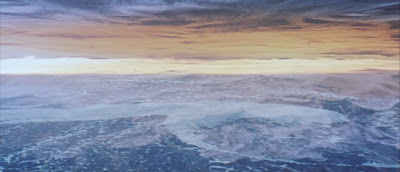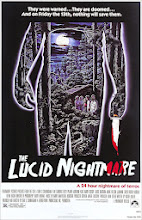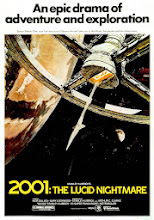CQ
Director: Roman Coppola
Year 2001
CQ is something of an enigma, in that it is about so many different things, yet it's all held together by the central character's love of the cinema and its unmistakable power to tell a story, whether truth or fiction. This freshmen effort by Roman Coppola, is a rather ambitious undertaking that carries the weight of a lot of well thought out ideas about love, life, personal dreams, and the never ending struggle to find balance in ones life. It's told in a dream like haze where film mixes with life in vibrant and unusual ways, pressing the boundaries as we follow a young filmmaker on his journey to find himself in personal and professional stability. It's really a wonderful movie that wears its heart on its sleeve, giving an affectionate look into one person's journey to find truth and substance in the everyday search for personal acceptance.
 |
| Wow! The future is going to be awesome! |
The film follows a young dreamer by the name of Paul, played by the always outstanding Jeremy Davies, as he balances between his cinematic ambitions in the film industry and his personal relationships in the year 1969 in Paris, France. While working on a groovy sci-fi film called Dragonfly, Paul must overcome his deteriorating relationship with his live in girlfriend Marlene, and at the same time try to complete his personal independent film that focuses on truth, reality, and understanding, which happen to be all the things that he is struggling with within his own life. In an almost therapeutical sense, Paul speaks to the camera in his documentary, putting together the pieces of his mentally hectic life as he begins to understand himself and reach out for happiness.
 |
| A peaceful moment on the crapper. |
This film is almost an inner look at what it is like when you struggle to find yourself and your voice in a world that seems so overrun with uncertainty and improbable possibilities. Coppola tackles this notion with great ease, making us feel for Davies' character. He seems to connect with the audience and it appears that Coppola is pulling these same uncertainties from his own life. Narratively speaking, it lies close to the director's heart, possibly stemming from being the son of a world famous director and having to fill the rather large shoes of the directing legend. In all aspects, it's very personal in its presentation and in this fashion, he is able to bring us an outstandingly poignant story, one that has relevance in most everyone's experienced memories of grand aspirations and incessant fears of failing. This is both intimate and compelling, as we begin to take a part of this man's journey onto ourselves and share in the burden of self worth and realization.
 |
| I know someone who looks absolutely FABULOUS in her polar bear hat! |
The imagery of this film complements this tangible struggle, by rooting it in a period that seems so full of life and lavish vision. It's a time that was substantially grounded in the physical, both humanistically and cinematically speaking. It was a place where film was king and the physical nature of the medium, both splicing and developing, was a more personal undertaking for the filmmakers then as of now with the cold impersonal touch of the new digital age. Setting this film in 1969, gives a great opportunity for Coppola to express his utmost love for the cinema and for a good many works that have inspired him throughout his own journey to become a filmmaker in his own right. That personal endeavor is mirrored perfectly in the role of Paul as he uses his own black and white film to answer the many questions he has about life.
 |
| This film is simply DAZZLING! |
Paul's quest to present something real and tangible in his independent film, juxtaposes the work that he is doing on his sci-fi feature. The Dragonfly film is hip and kitschy, but doesn't satisfy his inner artist, while the independent endeavor serves to calm his creative urges. In doing this it maintains a balance that he isn't able to accomplish within his own romantic relationship with Marlene. In his documentary he speaks to the camera, asking questions about who Marlene is and what she truly wants from the relationship, as if the answers will suddenly become clear to him or inspiration will suddenly strike. Through random bits of footage that he has shot, in contrasting black and white, we get a look into their lives and get to witness the life the couple share. There's moments that are really genuine, like the sequence that has Marlene asking Paul why he films everything. He responds that he wants to portray the truth and show people something that is real. She responds by asking, but what if people find it boring. It's those moments that show so perfectly the fine balance, both in his artistically driven aspirations and in his personal relationship with Marlene, that he must attempt to maintain.
 |
| My god man, will you put some damn pants on! |
In doing this, Coppola is in fact accomplishing the same thing that Paul is trying to achieve. He's bringing about a real snippet of the lives of this couple as they battle to find some kind of happiness or worth in their relationship. Paul's battle is to quench his creative muses while Marlene's battle is to vie for the attention of Paul and to come to a decision if this whole thing is worth it. The give and take of the themes of this film, work really well off each other and the blending of both the cinematic elements with the very personal struggle of the two lovers is an inspirational combination. Things only get more complicated as the film introduces Paul's new love interest, in the form of the Dragonfly actress, Valentine, who seems to encapsulate all that he is looking for in order to achieve a balanced existence in both career and life. The only problem is that these urges could be just a symptom of Paul's need to escape from the dying relationship that he is already in or it could indeed be a beacon for a new and fruitful life.
 |
| You should really clean your ears out once in a while. |
To see these very personal themes being played out, is something of a rare treat. Unknown to me, I have never viewed a film that combined such unrelated elements and then managed to infuse them together to portray the story of a man's uncertainty in life, love, and everything a coming of age tale encompasses. There truly is a lot to be said for Coppola's inspiration and bold execution in delving into the film in this manner, relying on the integrity of the heart of the story to pave the way through the twisted narrative. As we flow between all of these intoxicating ideas, we never lose the point of the story. The incidental nature of Paul's random undertakings, in both business and personal situations, never seem to reach too far away from his centralistic pursuit of following his heart and essentially discovering the secret to happiness. It's really a pleasant surprise to see such a young director tackle such a colossal undertaking and in the end, just nail it.
 |
| I see what you're looking at you little pervert. |
Not only does Coppola nail the emotional and spiritual story arch of the piece, but he also nails the overall look of Paris, 1969, at least in film form that is. Garnering inspiration from countless films of the era, Coppola paints a beautiful collage of stereotypical elements of the age from the groovy and camp visuals of the Dragonfly film to the dress and wear of everyday life. Fellini would be proud, for there's many moments that seem stripped from the pages of his ever impressive visual hand book. I just loved how most of this film felt so familiar, yet fresh and new at the same time. One could say that this film pays homage to that era and that is quite true, yet it's done in such a way that it never takes away from the film or cheapens it in any way. The similarities are blended so well into the narrative that you almost consider it a companion piece to those beautifully cherished films.
 |
| Hello Dean. You are a stupid head. |
Coppola's mesmerizing, homage filled cues, also play a great part in conveying the surreal and atmospheric quality that saturates the frames in the waning moments of the film. The blending of Paul's love for cinema with the real world, gradually begins to blur together until we aren't sure if what he is experiencing is in fact the truth or something else entirely, which is a brilliant play on the material and compliments what we see prior in the film. Paul's pursuit of creating something that is real and truthful in his documentary, has now become something of an obsession where he is beginning to lose his grip with reality. He's losing himself in the fantasy that he longs for to be true, while subsequently letting his real life relationship with Marlene fall to the way side in conquest of a dream girl that could and could not actually feel the same way or even really exist in the real and definitive sense. It boggles the mind and adds so much to the final representation of the film.
 |
| Godzilla! Godzilla! |
The conclusion of all this madness is reached in full realization as Paul comes to terms with his dead in the water relationship and satisfyingly is able to make a conclusive ending to both his sci-fi feature and his independent personal piece. Both conclude with a rebirth in the character, expressing a hopeful outcome on things to come. Paul's rebirth mirrors the end of his failed love and the start of a new relationship, both in cinematic pursuits and in soul searching. The ending is rather beautiful as it ties up all the loose ends of Paul's life and breathes an air of relief as the madness and confusion dissipates into the memories of the past. Paul's character comes full circle, just as every filmmaker does when completing a project and looking to the future. Always optimistic on what's on the horizon. Always confident that they will perfect their craft and learn from their mistakes. The metaphorical context is abundant and the richness of the entire piece can be solely credited to Coppola's daring decision to put so much of himself into the film.
 |
| Could you be... the most beautiful matte painting in the world. |
CQ is a filmmaker's allegorical journey from project beginning to project end, comparing the likes of creative minds most beloved things, their personal and professional loves. This comes off as Coppola's love letter to a cinema age that is long gone but not forgotten. The way that so many complicated elements within the film come together so nicely, speaks volumes on what true talent this first time feature director really has. The intimate quality of the film is beyond words and you can feel the humanistic radiance of the narrative like a beacon shining from the main characters soul, thanks to the expert acting and sympathetic portrayal of Jeremy Davies', Paul.
The combination of Coppola's imaginative story and Davies' wondrous performance, really add to the overall appeal of the piece and provide a film that won't easily be forgotten or idly be dismissed. This film comes highly recommended to anyone you loves films that celebrate the cinema and the inspirational and personal stories that can sprout from its silver screen. CQ is a small film, but with a giant heart, one that might catch you off guard if you're not ready. Watch it for the film lover in you.
5 out of 5 stars A Cinematic Love Letter to Life and Love!




















































































































